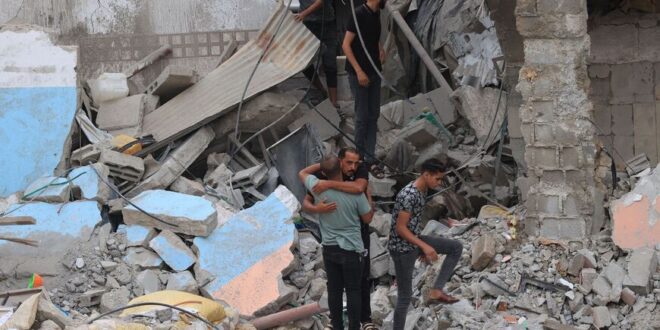The Israeli airstrikes and decision to cut off water and power supply to the already besieged Gaza Strip have the residents on edge.
The Israel-Hamas military escalation in the Gaza Strip has caused a humanitarian disaster for residents of the small coastal enclave on the shore of the Mediterranean Sea.
The escalation entered its third day, as Israel intensified its airstrikes on dozens of targets in the Gaza Strip in response to Hamas’ surprise offensive early Saturday morning, when Hamas fighters penetrated the Israel border and stormed the Israeli settlements in the Gaza envelope, killing dozens and taking hostages.
As of Monday, the death toll among Israelis has risen to at least 900, according to Israeli media reports, and the number of wounded exceeded 2,000. Meanwhile, Israel’s Government Press Office confirmed in an infographic that at least 100 Israelis are currently being held captive in Gaza.
On the Palestinian side, the Hamas-run Health Ministry in Gaza said in its latest death toll that at least 560 people have been killed in Israeli airstrikes since Saturday, while 2,900 others were wounded.
As Israel continues to pound the Gaza Strip, shops and other commercial establishments across the enclave closed their doors, and the streets have been deserted with only a few risking their lives as they stand in long queues in front of the few bakeries that remain open.
Thousands of people were also forced to leave their homes and seek shelter in schools affiliated with the UNRWA refugee agency.
“Nearly 137,500 displaced people are now in 83 UNRWA shelters, with numbers likely to increase as heavy shelling and airstrikes continue, including on civilian areas,” the UNRWA said in a press release on its website on Tuesday. It added that one of its schools sheltering more than 225 people was severely damaged in a direct strike, but no casualties were reported.
“What Hamas did was unbelievable and unexpected. We felt that it was a dream, but the intense Israeli bombing proved how serious what happened was,” said Mahdiya Mustafa, a mother of six who fled to a UNRWA school with her family and most of her neighbors.
“We were terrified and dismayed when Israel began bombing civilian homes in Beit Hanoun in the northern Gaza Strip. Our house was destroyed right in front of our eyes. That’s when we fled to a UNRWA school,” she told Al-Monitor.
Despite finding shelter, Mustafa said that she and her children are living in constant fear for their lives since Israel has already targeted another UNRWA school.
In a move that will most likely worsen the humanitarian situation in Gaza, Israel’s Cabinet announced on Sunday its decision to cut off water and electricity and stop the flow of goods into the already besieged enclave.
Muhammad Thabet, director of public relations and media at the Hamas-run Gaza Electricity Distribution Corporation, told Al-Monitor that power shortages hit 80% after Israel stopped the flow of electricity to Gaza. He added that the number of supply hours is currently down to four a day.
Gaza normally receives 120 megawatts of electricity from Israel, he said, and another 65 megawatts are produced by Gaza’s sole power plant. Thabet said that the current fuel reserves to keep the plant operating will last until Tuesday, warning of an imminent humanitarian disaster once fuel runs out as vital sectors like hospitals, municipal water pumps that transport water to citizens’ homes, and sewage treatment plants will be severely affected.
Olfat Abdelall says she only gets two hours of water a day supplied by the municipality, which is already barely enough to meet the needs of her five children. She told Al-Monitor that she filled her bathtub with water to be ready to use for dishes and showers when the water supply is completely cut off.
Abdelall also lamented the lack of power, saying food in her refrigerator has already spoiled and they are now eating canned foods such as sardines, beans and peas.
The Palestinian Water Authority accused Israel of committing serious violations by cutting off water and electricity as a collective punishment to Gazans. In a statement released on Sunday, the authority warned of the dangerous repercussions of the Israeli move, which has already affected water supplies in several areas of the Gaza Strip.
Hosni Mhanna, spokesman for the Gaza Municipalities Union, told Al-Monitor, “Water treatment plants have stopped operating due to power cuts, and [municipalities] are now pumping nearly 250,000 cups of untreated wastewater into the sea.”
Mhanna said that the collection and transport of solid waste to the main waste dumps have also been affected by the power cuts, portending a serious humanitarian disaster with the potential spread of diseases in residential neighborhoods.
Israel’s decision to stop electricity and fuel supplies to Gaza also casts a shadow on the health sector, with fears that “hospitals will turn into mass graves,” said Muhammad Abu Salmiya, director of Gaza’s Al-Shifa Hospital.
He told Al-Monitor that the hospital currently has a fuel stock sufficient for three days at most, as the hospital needs 50,000 liters of fuel per day to operate.
“When this quantity of fuel runs out, we will be facing a real catastrophe. At least 80 people are currently living on ventilators and 60 babies are in the premature ward — [their] survival depends on electricity,” Abu Salmiya warned, adding that emergency operations departments and oxygen generation plants will also be affected.
 Eurasia Press & News
Eurasia Press & News



